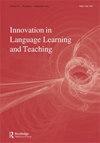Revisiting Saudi EFL learners’ autonomy: a quantitative study
IF 4.6
3区 教育学
Q1 EDUCATION & EDUCATIONAL RESEARCH
Innovation in Language Learning and Teaching
Pub Date : 2023-01-18
DOI:10.1080/17501229.2023.2166512
引用次数: 1
Abstract
ABSTRACT Purpose The purpose of this study is to examine Saudi EFL learners’ autonomy beliefs, the relation between their autonomy beliefs and autonomy practices, and the major obstacles against their autonomy. Design/methodology/approach In this quantitative study, a survey questionnaire was administered to 350 (N=350) students in the English Language Center of a public university in Saudi Arabia. The SPSS version 26 was used to conduct the statistical analysis of the data. Pearson’s correlation analysis and the Paired t-test were used after the normality test of the studied data, and the percentage analysis was used to gauge the major obstacles for Saudi EFL learners’ autonomy.In this quantitative study, a survey questionnaire was administered to 350 (N=350) students in the English Language Center of a public university in Saudi Arabia. The SPSS version 26 was used to conduct the statistical analysis of the data. Pearson’s correlation analysis and the Paired t-test were used after the normality test of the studied data, and the percentage analysis was used to gauge the major obstacles for Saudi EFL learners’ autonomy. Findings The findings revealed that Saudi EFL learners are autonomous. A paired t-test showed that there was no significant difference between the autonomy beliefs and autonomy practices among the participants. In addition, Pearson’s correlation test detected a statistically significant positive relationship between Saudi EFL learners’ autonomy beliefs and autonomy practices. The study also identifies the following major obstacles against Saudi EFL learners’ autonomy: over reliance on their teachers and on their test results, lack of opportunity to express their opinions about learning and not discussing how they work out their learning tasks. Originality/value Autonomy studies conducted in the Saudi EFL contexts have adopted only the dichotomous view of learner autonomy in which learners are categorized either autonomous or non-autonomous. No reported studies seem to explore the ‘Alternative view’ (Little, 2011) of learner autonomy, which challenges this dichotomous view and looks beyond the categories of autonomous and non-autonomous language learners. Similarly, it also appears that examining the relation of Saudi EFL learners’ autonomy beliefs and autonomy practices has been overlooked. Therefore, the current study aims to present an in-depth understanding of Saudi EFL learners’ autonomy with sound theoretical underpinning and methodological rigour. Adopting Little’s (2011) alternative view of learner autonomy as its theoretical framework.沙特外语学习者自主性再探——一项定量研究
摘要目的本研究的目的是考察沙特阿拉伯英语学习者的自主信念、自主信念与自主实践之间的关系以及影响他们自主的主要障碍。设计/方法/方法在本定量研究中,对沙特阿拉伯一所公立大学英语语言中心的350名学生(N=350)进行问卷调查。采用SPSS version 26对数据进行统计分析。在对研究数据进行正态性检验后,使用Pearson相关分析和配对t检验,并使用百分比分析来衡量沙特英语学习者自主学习的主要障碍。在本定量研究中,对沙特阿拉伯一所公立大学英语语言中心的350名学生(N=350)进行了问卷调查。采用SPSS version 26对数据进行统计分析。在对研究数据进行正态性检验后,使用Pearson相关分析和配对t检验,并使用百分比分析来衡量沙特英语学习者自主学习的主要障碍。研究结果表明,沙特的英语学习者是自主的。配对t检验显示,参与者的自主信念和自主实践之间没有显著差异。此外,Pearson相关检验发现,沙特英语学习者的自主信念与自主实践之间存在显著的正相关关系。该研究还指出了沙特英语学习者自主的以下主要障碍:过度依赖老师和考试成绩,缺乏表达学习意见的机会,不讨论他们如何完成学习任务。在沙特的英语语境中进行的原创/价值自主研究只采用了学习者自主的二分观点,即学习者分为自主和非自主两类。没有报道的研究似乎探索了学习者自主的“替代观点”(Little, 2011),它挑战了这种二分法,并超越了自主和非自主语言学习者的范畴。同样,研究沙特英语学习者的自主信念和自主实践之间的关系似乎也被忽视了。因此,本研究旨在通过良好的理论基础和严谨的方法,对沙特英语学习者的自主性进行深入的了解。采用Little(2011)关于学习者自主的另类观点作为理论框架。
本文章由计算机程序翻译,如有差异,请以英文原文为准。
求助全文
约1分钟内获得全文
求助全文
来源期刊

Innovation in Language Learning and Teaching
LINGUISTICS-
CiteScore
6.90
自引率
6.70%
发文量
54
期刊介绍:
Innovation in Language Learning and Teaching is an international refereed journal devoted to innovative approaches to methodologies and pedagogies in language learning and teaching. It publishes research articles, review articles and book/materials reviews. It draws on a range of disciplines that share a focus on exploring new approaches to language learning and teaching from a learner-centred perspective. It will appeal to anyone interested in the development of, research into or practical application of new methodologies in language teaching and learning.
 求助内容:
求助内容: 应助结果提醒方式:
应助结果提醒方式:


